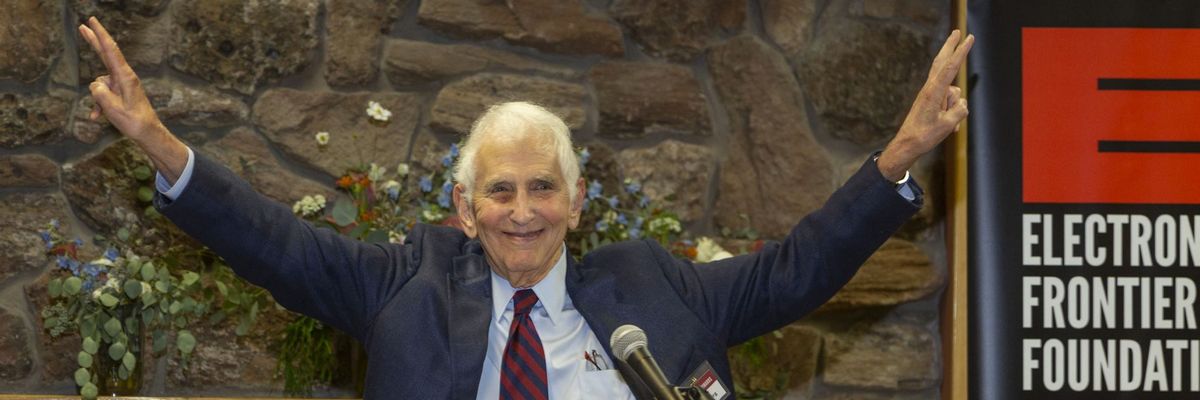The world lost an unmistakable voice this week, as Daniel Ellsberg passed away at 92.
Dan will be remembered for many things, of course most prominently providing the Pentagon Papers to the New York Times in 1971. Although he hated being called one, he was rightly a hero to anyone who believes that we must be in a position to evaluate our governments and cast our votes based upon truth rather than lies.
The biggest lesson Dan taught me was to see the dangers arising from governmental secrecy from the position of those keeping the secrets. Dan talked about how the government was too often driven by what he called “smart dumb” people. He talked about how governmental officials' proximity to power and insider knowledge led them to do stupid things—like continuing a war that was clearly lost, or lying about weapons of mass destruction—and how these kinds of terrible misjudgments and mistakes are as inevitable as they are insidious. Dan was as steadfast in debunking the myths surrounding governmental secrecy as he was in giving unwavering public support to others who took courageous steps to tell the truth about illegal, immoral, and improper governmental actions, especially around matters of national security.
The biggest lesson Dan taught me was to see the dangers arising from governmental secrecy from the position of those keeping the secrets.
I first met Dan when I was helping with the creation of the Freedom of the Press Foundation. FPF was started in 2012 by Trevor Timm with help from Rainey Reitman and Micah Lee, who were all EFF staffers at the time, along with Laura Poitras, Glenn Greenwald and a few others. One of EFF's founders and Board members, John Perry Barlow, was also a driving force for the creation of FPF. I believe it was Barlow who brought Dan into the founding conversations. EFF served as legal counsel for the fledgling organization, and we still advise it at times.
I’ll never forget one of the first organizing meetings we held at EFF’s brick Mission District offices. Upon seeing Dan unceremoniously walk in to our little conference room, I was both tongue-tied and star-struck. But he didn’t seem to notice. He sat down and quickly helped us think through what the organization should be and how it should function. He was steadfast that the organization should stand up unapologetically for Wikileaks and Julian Assange, which had just published evidence of war crimes by the U.S. government in Iraq provided by Chelsea Manning. Wikileaks was subject to a financial blockade in which no payment processor would handle contributions to it. Dan went on to stand up for—and attend the trial of—Chelsea Manning, and much later he stood firm in support of Ed Snowden. Dan’s certainty and conviction were contagious, as was his courage.
EFF later held a public event in Berkeley discussing NSA spying, where Dan spoke. He explained how those who are charged with keeping secrets become convinced that they are smarter and more capable than those who don’t have that information. He discussed how secrecy creates a feedback loop in which officials inside a secrecy bubble start to believe that they are invincible. They become subject to groupthink and so are increasingly unwilling to recognize legitimate criticism or concerns from those outside the bubble. He made clear the dangerous and corrosive power of governmental secrecy, something he had experienced, and then rejected, in himself.
Dan also was unflinching in asserting that most governmental secrecy is not necessary. “Most secrecy is not directed at keeping secrets from external nations, enemies, allies, or otherwise. It’s to keep secrets from Americans, Congress, and public courts. They’re the ones that have the votes and write the budgets,” he said at a Harvard Law School Human Rights Clinic event in 2011. “They’re the ones whose blame is to be feared.”
I'm also happy that EFF helped facilitate the first meeting between Dan and Chelsea Manning, at our November 2018 Pioneer Awards ceremony. Dan was lit up and exuberant that night: “I waited 39 years for her to appear in this world,” he said before detailing the significance of the documents Manning had leaked. He praised both her and Edward Snowden, saying, “I have often said that I identify more with them as 'revelationaries' than with any other people in the world."
The world will never see another Dan Ellsberg, but the legacy he leaves is bigger than his family and friends. His legacy is in all of the other whistleblowers and truth tellers out there today, and in those who will bravely step forward in the years ahead. May his memory be a blessing to us all.

